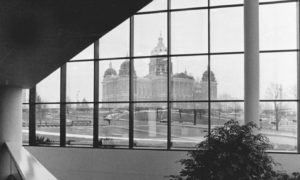There may be only one thing, packaged in a million variations, that can get our society back on track. We’ve got to forcibly remove ourselves from the echo chamber in 2015 and once again embrace the art of nuance.
Have you ever opened a black and white photo in an editing program and zoomed in on the image? If you have then you already know that what can be perceived as only black and white is actually a spectrum of light to dark. It contains black and white, of course, but also every variation in between.
All of the shades are necessary if the viewer is expected to have a full, detailed picture.
The same can be said of our lives and how we interact with one another.

As we grapple with our own perceptions of what constitutes undue force by members of law enforcement, how local departments acquire and display the military equipment they claim to need and when local residents choose to voice their displeasure, we must be active contributors to a clear picture.
It is possible to support local law enforcement while opposing the use of excessive force and questioning policies and purchases. We need to speak out when we identify activities that damage the relationship between local police and the communities they are duty-bound to serve.
The death of unarmed Americans, regardless of any resulting court decision, is a tragedy. It is, of course, a source of grief for family members and friends left behind, as well as a moment in time that will haunt the public servants involved.
The death of public servants, whether a result of unchecked mental illness or an ill-advised act of retaliation, proves nothing and accomplishes nothing.
Further screaming about either situation serves only to increase the noise surrounding serious situations and lesser-known facts.
Crime within America’s minority communities has been declining. Nonetheless, undesirable contact by residents of those communities with local law enforcement has increased.
On-duty police fatalities have also declined in recent decades — even as a large segment of the public has voiced concerns about increased military-type stances by local departments.
We cannot turn our backs on the progress gained anymore than we can turn our backs on the ground we’ve yet to traverse. We need to remember our history, understand our present and plan for our future. Moving forward requires citizens and law enforcement to work and build together. Shifting blame stymies these efforts.
Demonstrators are not responsible for the act of a single man. Incidents, even ones soaked in tragedy, may carry questions, but they do not offer blanket indictments of every police officer in every city.
To say otherwise, to claim any attempt at conversation and understanding is a violation of some arbitrary “us vs. them” scenario is not only wrong, but incredibly dangerous and counterproductive.
It’s time to zoom in on the big picture and lower the volume. This is the way forward: remembering that a different viewpoint is not an affront to your own.
This column by Lynda Waddington originally published in The Gazette on Jan. 3, 2015.
